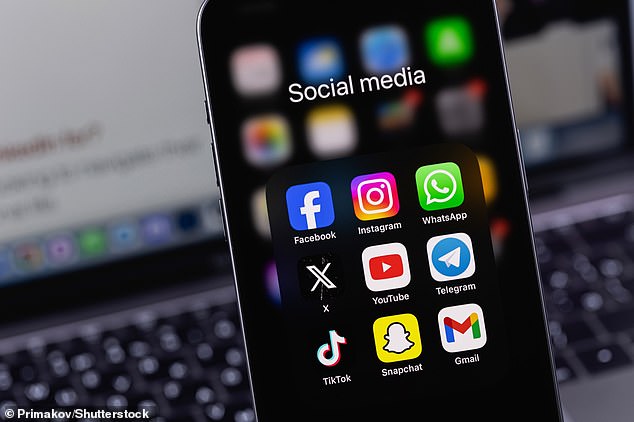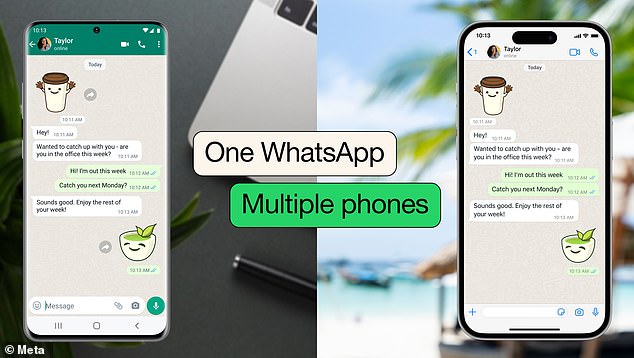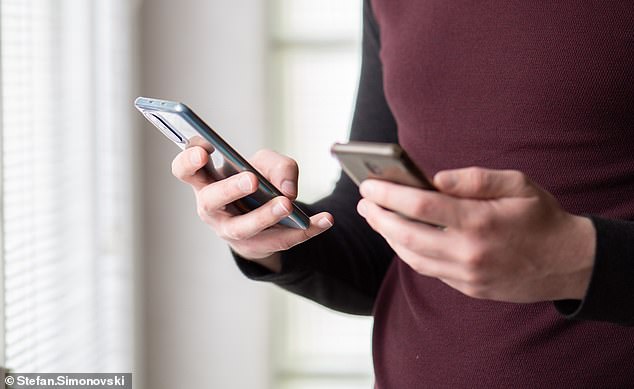Whether you are on a train, in a club or at a football match, there is a new habit of using smartphones that is becoming more and more common.
A growing trend of people is to carry not one, but two smartphones.
These ‘dual smartphone users’ (DSU) constantly switch between the two, or even use both at the same time, one in each hand.
Although it helps separate work from pleasure, carrying two phones can reveal a lot about your personality, according to psychologists.
David Sheffield, professor of psychology at the University of Derby, believes having two phones may be linked to anxiety or even neuroticism.
“If you’re more neurotic, you might use your phone more and worry more about battery life, so two phones provide a safety net,” he told MailOnline.
The average Brit spends four hours and 20 minutes on a smartphone a day or around a quarter of our waking life, new research has revealed.
But it’s still unclear whether having two means we spend more time looking at a smartphone.
Carrying two mobile phones, an increasingly common behavior, could reveal a lot about your personality, according to psychologists (file photo)

Britons spend on average more than four hours a day in front of a smartphone, but this figure may be so high due to an increasingly common habit.
Dr Zaheer Hussain, senior lecturer in psychology at Nottingham Trent University, said two phones could also be a sign of ‘FOMO’, the fear of missing out.
FOMO (the belief that others are having fun without us) has been linked to more intensive smartphone use, such as a greater number of apps used.
And the storage demands of all these apps could mean people have to spread them across two phones.
“People don’t want to miss news or notifications,” Dr Hussain told MailOnline.
“Also, social media constantly provides content, sometimes people mindlessly scroll through content due to a learned habit.”
Carrying two phones is usually just a way to separate work communications from personal communications during the week.
This tactic can make it easier to “unplug” from professional obligations in the evening and help keep work and life separate.
For example, employees can turn off their work phone while continuing to browse their favorite apps and catch up with friends before bed.

FoMO, a term introduced in 2004, includes two processes: first, the perception of missing out on a positive experience, followed by compulsive behavior to maintain these social connections, such as using our smartphone (file photo).
“Companies are increasingly likely to provide phones to their workers,” said Dr. Kostadin Kushlev of Georgetown University’s psychology department.
However, Maxi Heitmayer, a researcher in human-computer interactions at the London School of Economics, suggests there could be a downside to this.
“Many people seem to feel an expectation of being reachable at all times, both professionally and privately,” he told MailOnline.
“This leads to the unfortunate scenario where there are two devices attracting and competing for attention.”
For other DSUs, two phones may offer backup in case one runs out of battery, but this could be a symptom of “problematic” smartphone addiction.
In general, why people use two smartphones (and how this might be related to smartphone addiction) are “not frequently researched questions,” Professor Sheffield added.
Social apps like WhatsApp and Instagram allow multiple devices to log into the same account, which may be increasing the dual phone phenomenon.

Social apps like WhatsApp (pictured) and Instagram allow multiple devices to log into the same account, which may help the dual phone phenomenon.
Other DSUs may simply want to have the various capabilities of different smartphone models at their disposal at once, whether it’s an iPhone, a Google Pixel, or a Samsung Flip.
However, Dr Mark Griffiths, distinguished professor of behavioral addiction at Nottingham Trent University, said having two smartphones is “not a concern”.
“People are no more addicted to smartphones than alcoholics are to bottles,” Dr Griffiths told MailOnline.
“What people do on their smartphones can be addictive, not the smartphone itself.”

